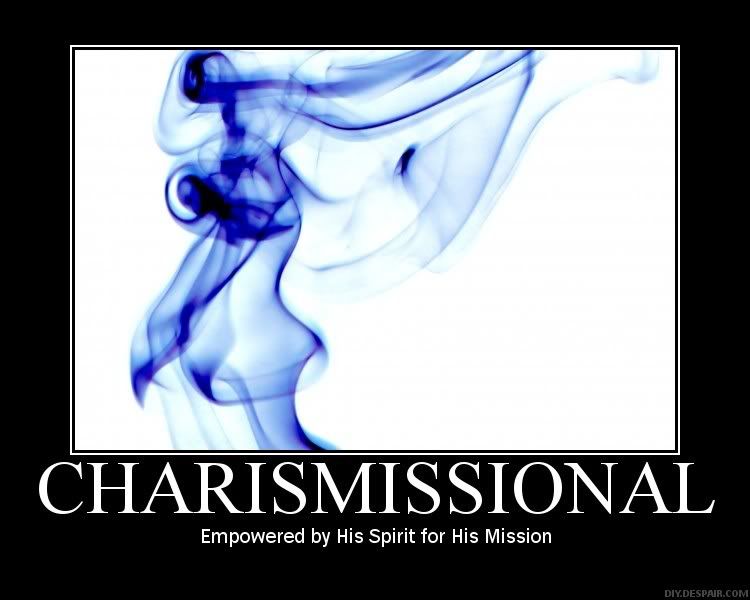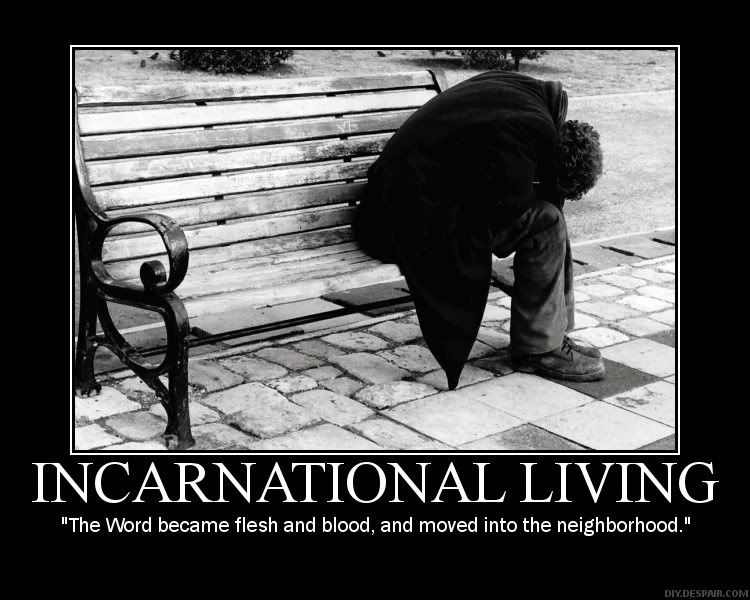Always reforming.
I recently read the 95 theses for the first time. It seems that Luther was quite the deconstructionist.
Reforming and emerging are really the same concept - the idea of becoming, as the church, all that God intends for us to be. Or as Paul would say, "growing up into him who is the Head, that is, Christ."
As a belated reformation day gesture, today I nail my versoin of 95 theses. Some of these are paraphrases of Luther's statements. Others, where I couldn't make much sense of the original thesis, are my own thoughts.
May we continue emerging, reforming, and becoming.
1. One's whole life should reflect repentance and a heart for the kingdom of God.
2. The life of the kingdom cannot be administered by clergy.
3. This inner change of heart must have an outward expression also.
4. Peace and shalom will become a reality for us as we participate in God's kingdom.
5. We are not condemned by men and their laws.
6. Neither can we be restored by men or religion.
7. God restores us as we humbly submit ourselves to the reign of Jesus.
8. We enter into this relationship and kingdom life while we are yet living.
9. The Holy Spirit is our teacher and reveals to us the heart of the Father.
10. Ignorant and wicked are the ministers who do not use their influence to lead others to this free relationship with God.
11. The church has been asleep, allowing religious tradition to replace the life God intended for his people.
12. Forgiveness and grace are available to all, even before they believe.
13. God's grace frees us from death and condemnation.
14. The condition of a soul separated from the love of God is fear and hopelessness.
15. We should not forget the despair of being lost.
16. Hell and heaven are current realities, as are despair and shalom.
17. With souls in the balance, it seems that love must increase to counter despair.
18. There is no one outside the bounds of God's love.
19. There is assurance of salvation for those who believe in Jesus.
20. This salvation is the free gift of God through Jesus, not dependent on anyone or anything else.
21. Those who suggest that salvation or God's approval can be earned are in error.
22. They hinder access to the free grace of God.
23. We are all undeserving of God's grace.
24. We are deceived if we believe that we can earn God's blessing.
25. A minister has no authority except that which is given to him by those who submit themselves to him.
26. A leader does well when he leads, not with power, but with humble service.
27. It is deceitful to suggest that giving money to a ministry releases God's blessing.
28. Money and greed can distract the church from the real message and ministry of the power of God.
29. The condition of a man's heart is known only to God.
30. Our own heart can deceive us.
31. The wise man remains humbly aware of his brokenness.
32. Those who try to earn their salvation, and those who teach this, will miss experiencing the grace of God.
33. Beware of teachers and leaders who presume to mediate God's grace.
34. Traditions and rituals do not have the power to redeem or restore.
35. True Christian doctrine points us to relationship with Jesus and the life of a disciple.
36. Forgiveness is available freely to those who call on the name of Jesus.
37. Every Christian is an equal member and participant in the church, the body of Christ.
38. Participation in the life of the church is necessary in the formation of a disciple.
39. It is difficult, even for the wisest teachers, to adequately present the fullness of God's love and kindness.
40. True repentance recognizes the life and peace found in choosing God's way.
41. Sermons and teaching should not be preferable to good works of love.
42. Tithes and offerings cannot replace or substitute for acts of mercy.
43. Giving to the poor and needy is better than paying dues at church.
44. Growth comes by loving others rather than by religious duty.
45. How can we see a man in need and pass by, missing the opportunity to show the love of God?
46. One should be responsible first in caring for the needs in their family.
47. Giving is an expression of love from the heart, not an obligation.
48. Leaders should be more interested in prayers than pocketbooks.
49. It is useful to be taught and equipped by others, but this should not replace dependence on God.
50. Leaders who build their empires on the backs of those whom they were entrusted to serve will eventually come to ruin.
51. God does not turn a blind eye to corruption in the church.
52. Church membership does not guarantee salvation.
53. The message of the gospel of the kingdom will always be relevant.
54. Injury is done to the cause of Christ when this gospel message is replaced with self-help sermons or with narrow legalism.
55. The gospel, which is the very greatest thing, still has the power to change lives.
56. This power has not been adequately known or demonstrated by the people of God.
57. Many of the gifts and blessings given to the church have been hoarded rather than poured out.
58. When the power of the gospel is made known, it will always work grace for the inner man.
59. One of the treasures of the church is the poor among us.
60. Christ demonstrated for us the keys and manner of life in the kingdom.
61. Life in the kingdom cannot be experienced apart from knowing Him.
62. The true treasure of the church is the gospel of the glory and the grace of God.
63. The subversive nature of the gospel is often ignored because it requires that the first be last.
64. The real life of the kingdom is demonstrated when the last are made to be first.
65. The kingdom does not favor men of power, wealth, and influence.
66. Rather it recognizes the treasure to be found in the souls of the poor and marginalized.
67. Some preachers' greatness only serves to build their personal kingdom.
68. These kingdoms are worthless when compared to the reality of God's kingdom and grace.
69. Yet they establish power and influence for themselves within the church.
70. They preach their own dreams rather than the gospel.
71. Woe to those who succumb to the temptations of fame and greatness.
72. Blessing to those who guard against the lust of power and influence.
73. There should be concern about those who strive for power in the church.
74. Much more, there should be outrage over those who injure love and truth in their quest for position.
75. To think religious rituals have the power to save - this is madness.
76. They will do nothing to remove guilt or shame.
77. Even the greatest apostles did not have the power to forgive or save.
78. Yet even the least believer is given access to the grace, power, and spiritual gifts of God.
79. It is blasphemy to allow religious traditions and doctrine to overshadow the simplicity of the gospel.
80. Ministers who do so will account for their narrow misrepresentation of God's message.
81. This misrepresentation makes it difficult to rescue the true message of the gospel from legalism and religious tradition.
82. Why has the simplicity of the gospel become overwhelmed and complicated by layers of institution and hierarchy?
83. Why do clergy teach followers to be indebted to and dependent upon them?
84. Why has the free gift of grace become shrouded in religious obligation?
85. Why have the traditions of church been embraced as if the traditions themselves carried the weight of Scripture?
86. Why do church organizations absorb so much of the money that should go to the poor?
87. Why have gatherings been structured as if only one person is capable of sharing their gifts and talents?
88. What a greater blessing it would be if every believer were to participate in gatherings and ministry.
89. Those who are truly interested in the salvation of souls will minister freely without regard for position or titles.
90. To repress these questions of how the church functions will only serve to add to the decline of the church as it currently exists.
91. When the church truly reflects the message of Christ it will be credible to the world.
92. Woe to those who refuse to recognize this challenge to the status quo.
93. Embrace the prophets who call us to envision the potential of the church and the reality of the kingdom in our midst.
94. Christ-followers must live according to the way of Christ, our example.
95. Even if this way leads to suffering, we are confident of the reality of the kingdom of God in which we live.





 (photo ht Len Hjalmarson)
(photo ht Len Hjalmarson)








